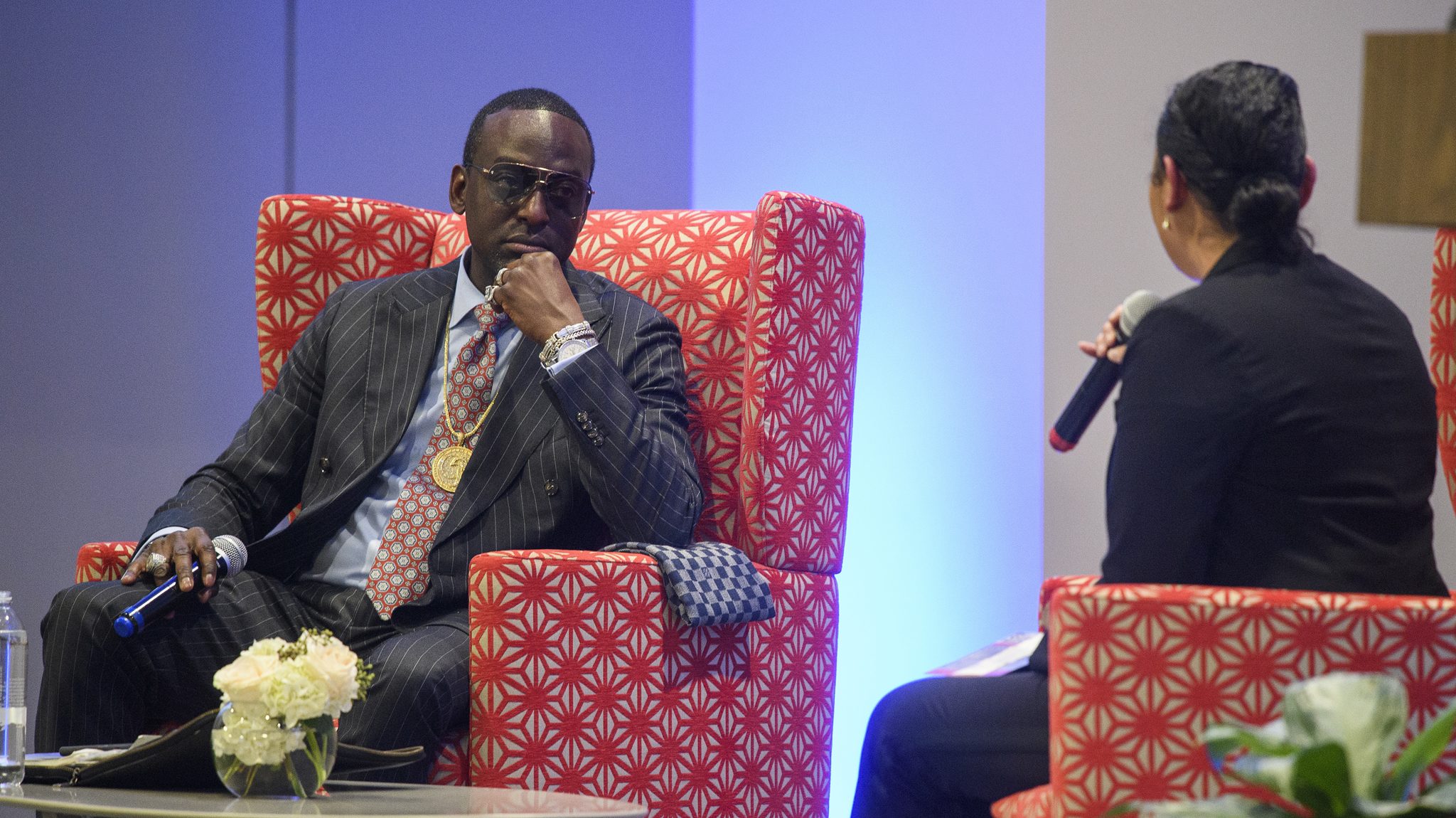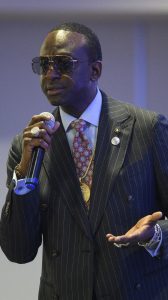
Yusef Salaam (left) listens attentively to post-address questions asked by Brittany Brown, a UM graduate student. Photo by Thomas Graning/Ole Miss Digital Imaging Services
OXFORD, Miss. – Alternately calling the historic Central Park Five case “a whisper into the darkest enclaves of American society” and “a love story between God and His people,” Yusef Salaam reflected upon his journey from a wrongfully incarcerated teen felon to fully exonerated free man.
A member of the Exonerated Five – formerly known as the Central Park Five – Salaam delivered the Black History Month keynote address Tuesday (Feb. 25) at the University of Mississippi. Hundreds of students, faculty, staff and local citizens filled the Ole Miss Student Union Ballroom to hear the speaker’s perspectives on his experience.
“The Central Park Five case is not what you think it is,” Salaam said. “Yes, it appears to have been a grave miscarriage of justice, but it’s actually a love story between God and His people.
“Our case demonstrated that there are miracles in modern times. It showed us that we can be brought low, only to rise again because the truth can’t stay buried.”
Salaam began his remarks by describing the events following the 1989 arrests of himself and four other teenagers – four African American and one Latino – for the brutal rape of Trisha Melli, a young woman in New York City’s Central Park. They were tried and convicted of the crime in a frenzied case that rocked the city.
But in 2002, a convicted murderer and serial rapist confessed to the crime, and DNA evidence found at the scene corroborated his story. The convictions of the Central Park Five were vacated, after the four teens had spent six to seven years behind bars and the one tried as an adult had been incarcerated for 14 years.
“I was introduced to the world in a tsunami of media coverage which invaded our lives and defined what and who we were,” he said. “Through what was printed and said about us, the idea was perpetuated that only people from the black and brown community could be capable of committing such a heinous crime.”
Salaam said the case was also a message whispered into the darkest enclaves of society that it was permissible to do to them, as African American and Latino youth, what was done to Emmitt Till, an African American teenager from Chicago who was brutally murdered in Mississippi.
“They did things to us that shouldn’t have been done to any 14-, 15- and 16-year-old children,” Salaam said. “They wanted people to storm into our apartments, beat us up, shoot us in the head and throw our bodies into the river.”
During his incarceration, Salaam said he was protected by older inmates connected to the Black Panther Party and the Black Liberation Army. These men told him that they were all political prisoners.

Yusef Salaam discusses his pre- and post-incarceration experiences during the Black History Month keynote presentation at the University of Mississippi. Photo by Thomas Graning/Ole Miss Digital Imaging Services
“I said, ‘Thank you, Lord!'” he said. “I truly believe God doesn’t put any more on us than He knows we can bear. Once I understood the reason why I was being wrongfully imprisoned, I knew I could survive how long it took until I would be free again.”
Salaam called attention to the duality of the American society in which ethic groups are “separate, but unequal” in the criminal justice system.
“The Central Park Five case is not an anomaly,” he said. “Rather, it is a microcosm of what continues to go on in this society. The problem of racism in America is so deep that it’s in our DNA.”
Salaam quoted several renowned figures, including civil rights icons Martin Luther King Jr. and Malcolm X, author Maya Angelou and motivational speaker Les Brown.
“As my friend Les Brown once told me, ‘If one person is wrongfully imprisoned, that’s one person too many,'” Salaam said. “We must become a country where, as Dr. King said, ‘We are judged not by the color of our skin, but by the content of our character.'”
Though the idea of imprisonment as a “rite of passage” into manhood is prominent in the African American and Latino communities, Salaam called the concept a “a lie.”
“Who gave us the thought that we must either be in prison or dead by the age of 21?” he asked. “It’s a certain type of evil cast into our communities that devalues us. Don’t believe the negativity and lies we’ve been told. We are worth everything. We matter.”
Since his release, Salaam has committed himself to advocating and educating people on the issues of false confessions, police brutality and misconduct, press ethics and bias, race and law, and the disparities in America’s criminal justice system.
In 2014, the five men received a multimillion-dollar settlement from the city of New York for its grievous injustice against them. Salaam was awarded an honorary doctorate that same year and received the President’s Lifetime Achievement Award in 2016 from President Barack Obama.
Salaam was appointed to the board of the Innocence Project in 2018.
In May 2019, Netflix released a limited series called “When They See Us,” based on the story of the Central Park Five and directed by Ava DuVernay, with Oprah Winfrey and Robert DeNiro among the executive producers. The four-part series was screened at Ole Miss beginning in January.
The speaker ended his message calling for a paradigm shift that would begin to break the cycle of incarceration and restore hope to the next generation.
“Education is the key,” Salaam said. “Inmates like myself who get an education never come back to prison. There are things you have to go through, but they can become things that you grow through.
“We’re resilient. We can do anything. We just need to dream and believe in ourselves again.”
Cade Smith, UM assistant vice chancellor for community engagement, welcomed the audience to the program. Salaam was introduced by Arielle Hudson, president of the Black Student Union, and interviewed afterwards by Britany Brown, a 2019 Ole Miss journalism graduate and a Southern studies graduate student.
Norris “EJ” Edney III, director of the UM Center for Inclusion and Cross Cultural Engagement, gave closing remarks.